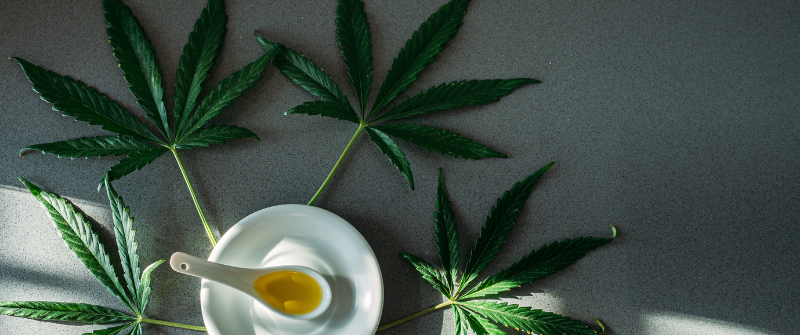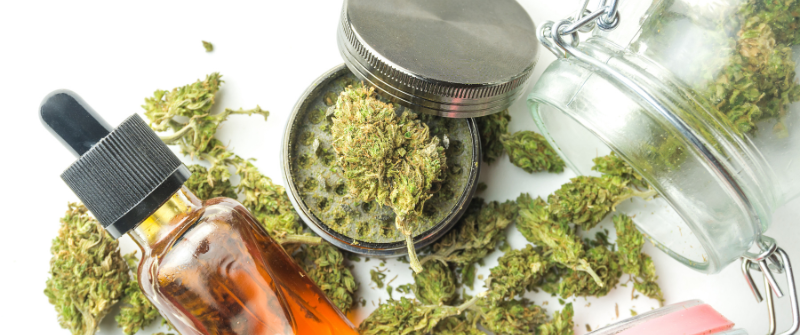
Have you ever considered using marijuana to calm your emotions? Whether you use cannabis to manage depression, anxiety, stress, etc., marijuana reportedly can make you feel better.
Cannabis has a reputation for many things, including dissociation. Many people self-medicate with medical marijuana because it makes it easier for them to manage their mental state when exposed to stressful or harmful situations.

Emotions are innate and developmental yet intangible feelings that determine learning and survival behaviors. As critical as emotions are to human existence, the evidence necessary to define them in scientific detail was quite limited until recently.
During the 1970s, Paul Ekman, an anthropologist and psychologist, came up with the theory that emotions can be classified into six categories¹: fear, anger, happiness, disgust, surprise, and sadness. This theory has been widely disputed throughout the years, with contradictory claims stating there are as little as four and as many as 27 basic human emotions.
There is no definitive or consolidative evidence among various cultures worldwide about whether emotions are innate or learned by experience or trial by fire. However, significant research highlights the three dominant areas of the brain responsible for feelings: the amygdala, insular cortex, and midbrain.
The Amygdala is a small, almond-like gland inside the deep regions of the brain. The amygdala processes and regulates emotions², their effects on behavior, and inspiration. The amygdala’s emotion center influences the survival aspects of human behavior, such as:
The connection between the amygdala and its effects on emotions and behaviors lead to the discovery of classical conditioning. Ivan Pavlov, a Russian physiologist, proposed that behaviors can be learned by repetitive exposure to a reward or pleasant stimuli to elicit a set or specific emotional response.
The Midbrain, also clinically known as the periductal gray, is responsible for pain perception. The midbrain is located in an area of the brainstem that is rich in opioid receptors. These receptors are responsible for the pain suppressive and relief properties in opioid-based pharmaceutical drugs, most notably oxycodone and morphine. The survival effects of emotional responses triggered by the midbrain are the ability to dissociate oneself from exposure to intense or unpleasant stimuli.
Clinical evidence also highlights the midbrain’s role in certain behaviors and actions, especially for defense and reproductive purposes. There is a strong correlation between certain mood disorders like stress and anxiety, emotional and behavioral responses, and increased activity in the periaqueductal gray.
The insula cortex is also referred to as the insular cortex. This portion of the emotion center in the brain is responsible for feelings associated with hate, dislike, disgust, and other adverse reactions to unpleasant stimuli. Clinical studies show how increasing activity in the insula cortex enhances the connection between emotional, physiological, and physical functions.
Elevated insular cortex activity also reportedly heightens the apprehension response (anticipation and realization) when exposed to stressful, unpleasant, or perceived threats or situations.
Among the various effects of cannabis is its impact on emotions. Marijuana is an organic plant that has cannabinoids and terpenes with properties that affect the body and brain. Cannabinoids are the molecules that enter the bloodstream and bind with G-protein-coupled receptors (CB1 and CB2) to activate and modulate neurotransmitter activity.
Did you know the human body synthesizes its own cannabinoids (endogenous) and has an endocannabinoid system? Also referred to as the ECS, the endocannabinoid system comprises receptors, ligands, and enzymes throughout the body.
The ECS is essentially a neuromodulatory system that regulates CNS (central nervous system) activity, neural plasticity, and response to internal and external stimuli. Before the recent discovery of the ECS, clinical research into its purpose was extremely limited, primarily impacted by the classification of marijuana as a class 1 federal illegal substance.
Among the most widely known cannabinoids are THC and CBD, respectively delta-9-tetrahydrocannabinol and Cannabidiol. THC is the most commonly known and abundant psychoactive cannabinoid in cannabis, besides CBD.
CBD is widely considered the polar opposite of THC because it lacks the sedative, disassociative, and psychoactive properties. Also, there’s growing clinical interest in the hundreds of cannabinoids in the cannabis plant, including CBD, CBN, and CBG.

THC, also known as delta-9-tetrahydrocannabinol, is the most prominent cannabis cannabinoid to date. THC is responsible for the hallucinogenic and psychoactive effects associated with marijuana use.
Cannabis cannabinoids reportedly alter the function of specific receptors in the brain and throughout the body. The most known effects include alleviating pain, lowering inflammation, preventing nausea, and improving appetite. Marijuana is so effective at improving these health symptoms and many more.
Now that there’s growing evidence of cannabis’ positive effects on the body, it has become a preferred and popular medication of choice for many suffering from severe and debilitating diseases. As beneficial as cannabis is for many, there are some downsides to consider.
The short-term effects of marijuana use include the following:
The long-term effects of cannabis include:
The side effects of marijuana are legendary in the cannabis community. Many users avoid them by being selective about the strains and dosages they consume.
Marijuana is full of cannabinoids, most notably CBD and THC. CBD is the polar opposite of THC in terms of psychoactivity. These cannabinoids produce various effects after binding with the CB1 and CB2 receptors in the brain and body.
There are many ways to use marijuana. Many people are unaware of how their method of use can impact their overall experience, including marijuana’s influence on their emotions. Those who don’t smoke can eat it, apply it as a topical, ingest it as a tincture, or vape it.
Smoking Cannabis: It’s important for users to avoid misconceptions regarding marijuana’s multiple consumption methods. Smoking remains the most common method of intake, despite the dangers of smoke inhalation on overall physical health. However, vaping is widely viewed as a safer alternative because there is no smoke to inhale. Vaping requires users to inhale a cannabis vapor or mist that reportedly doesn’t harm the brain or body unlike conventional smoking products.
Consuming Marijuana: Edibles are very popular among cannabis connoisseurs. Ingesting cannabis is a much safer alternative to smoking and vaping, but the effects take much longer to start for those seeking to relax or switch their thought processes off. The average onset time for marijuana edibles is between 30 minutes to an hour. However, that time frame varies per individual and is just a guideline. We highly recommend for marijuana users to dose carefully and responsibly.
Ingesting cannabis also intensifies users’ physical and emotional reactions. This may seem like the desired outcome, especially for those who self-medicate to relax or make their emotions more manageable. However, studies show a direct correlation between psychosis, anxiety, and depression with certain marijuana products that are more potent like edibles and concentrates.

The emotion center in the brain, comprising the amygdala, midbrain, and insular cortex, has a high affinity for certain cannabis cannabinoids, most notably THC. The amygdala regulates fear, anxiety, stress, paranoia, and other similar emotions. The emotional effects of THC are well documented, yet researchers are still learning about the mechanisms this cannabinoid modulates.
Using cannabis creates an influx of cannabinoids into the bloodstream and central nervous system. Remember, the body has a set amount of naturally occurring cannabinoids (endocannabinoids) at any time. Using cannabis significantly increases cannabinoid availability, activity, and stimulates the amygdala and emotion center in the brain.
This effect is thought to be the reason why some users experience an increase in certain emotions like anxiety, depression, and stress symptoms. Of course, it helps to note that this effect is primarily associated with THC-rich cannabis strains.
There are various cannabinoids and other influential properties in marijuana, many of which contain far fewer psychotropic properties. CBD is one of them and among the most widely researched to date. Currently, no direct evidence links CBD use to more severe psychoactive or emotional responses.
Among CBD, the most notable effect is its anxiolytic effects. Also, because it doesn’t bind directly to the receptors in the ECS, it seemingly doesn’t significantly impact emotions.
The central nervous system has an abundance of CB-1 receptors with a high affinity for cannabis cannabinoids. It helps to think of these receptors as a communication network responsible for relaying messages and information throughout the body. Many people feel noticeably calmer and relaxed when using cannabis.
Despite being legalized for medicinal use in 38 states and 19 states for recreational purposes, most enthusiasts use cannabis religiously to get a handle on their emotions. For many, the additional pain, nausea, and medical symptom relief benefits are a bonus effect.
Those who use medical marijuana for chronic pain management can thank their endocannabinoid or ECS system. Opioid receptors in the spine and other areas of the body also have a high binding affinity for cannabis cannabinoids, which helps to lessen the perception of pain and its response.
The effects of marijuana are not universal, meaning that everyone experiences its effects differently. Some people, especially those prone to and at an increased risk of anxiety and other mood disorders, don’t experience the euphoric effects of cannabis for long or at all. Regular or prolonged dosing intensifies users’ emotional response.
Among the known adverse effects of cannabis are its dampening influence on serotonin, a neurotransmitter known for its cognitive functions like reasoning, memory, and emotions.
Serotonin also functions as a hormone. Serotonin has a significant impact on the way you feel. Low serotonin levels are common in those suffering from emotional instability and mood disorders. Everyone needs a certain amount of serotonin for optimal functioning and well-being, especially mood stability.
Normal levels of serotonin help you process feelings and thoughts normally and keep you calm and relaxed, so it’s easier for you to think and concentrate.
Marijuana reportedly has a psychosis-inducing effect on some users. Introducing marijuana to the body makes it difficult for some people to regulate their emotions and thoughts normally and in a healthy manner. Their ability to ignore or rationally reason away certain feelings (the bad ones like stress, depression, and anxiety) are compromised. As a result, their perception, thoughts, and in some cases, behaviors become distorted. They may even begin to react to things that are not there, or develop psychosis.
Cannabis reduces the availability of serotonin (the feel-good hormone that also affects arousal and libido) in the brain when it first enters the body. As the effects of cannabis intensify, serotonin levels continue to level off, causing some users to feel more irritated, angry, and agitated. This effect is temporary.
As marijuana metabolizes from the body, normally within a few hours, it has an excitatory influence on serotonin activity.
Among the reported adverse effects of marijuana is addiction and substance abuse disorder. Cannabis is a substance that has addictive properties. Repeat and prolonged use can lead to tolerance issues that increase the risk of substance abuse disorder. The possibility of addiction is also higher with THC-rich strains. Currently, research is limited on the addictive properties of marijuana cannabinoids.
For some, marijuana use destabilizes their emotions. As their tolerance increases, it becomes harder for them to ignore their urges for the substance. They often have less control over their emotions and are more likely to exhibit aggressive or negative behavior in between doses. They may appear unstable or out of character to their loved ones like family, friends, and colleagues. Prolonged consumption intensifies these feelings and emotional responses.
As these intense negative feelings persist, the added stress of daily responsibilities increases the likelihood of them falling into a downward emotional spiral that’s common with withdrawal. These individuals have the highest risk of developing an unhealthy dependence on marijuana.

Not everyone who experiences the harmful effects of marijuana withdrawal can overcome them with cessation alone. Some users with high tolerance levels also experience persistent withdrawal symptoms and urges for cannabis, including emotional dysregulation.
The effects are similar but not as persistent or challenging for many users to overcome. Many people manage their tolerance levels by taking periodic breaks from use, also known as a tolerance break or with complete cessation.
Marijuana use can be a hard habit for some to break. THC potency and consumption methods do play a role as well. Certain methods of use tend to intensify the emotional deregulation effects of cannabis. Many people manage their tolerance levels by taking periodic breaks from use, also known as a tolerance break or with complete cessation. Some use smaller amounts or lower THC doses to manage their dependence issues. Others may require professional substance abuse therapy.
Currently, marijuana’s classification as a category one substance impedes clinical research into why some users develop dependence issues and others don’t. To avoid tolerance issues, visit your local dispensary and ask a budtender for CBD-rich and low-THC cannabis strain and product recommendations.
Dissociation is a major side effect of marijuana. It increases the time it takes users to identify the emotional state of others correctly. As a result, their misperception influences their emotional responses and, in some cases, triggers negative or harmful reactions.
Cannabis is arguably the most popular medicinal therapeutic of choice despite legalities, stigmas, and misinformation surrounding its safety and effectiveness. Many users prefer it to help them regulate their emotions instead of conservative antidepressants and psychiatric medications. Some even use marijuana to enhance the positive or offset the unpleasant and undesirable effects of pharmacology-based medications and treatments.
Here’s a deeper look into how marijuana interacts with your emotional regulation.
Many people use cannabis to cope with anxiety and stress. Studies show that low doses of THC-rich marijuana strains reduce anxiety and stress-related responses, while higher doses tend to exacerbate them. CBD is also helpful in lowering anxiety and stress because it doesn’t cause the dissociative effects associated with THC.
While this is good news for marijuana enthusiasts, it’s important to note that these findings do not account for common disparities unique to the user. Also, prolonged cannabis use does build tolerance. To gain the same effects, users would need to consume higher amounts, which can be contradictory to some individuals’ needs. High THC doses can lead to psychosis, especially in individuals with a predisposition for anxiety, depression, and other mental health disorders.
Research shows some correlation between cannabis use, elevated stress, and psychiatric and substance abuse disorders. Stress increases cortisol levels in the body and is a proven immunity suppressor and regulator of physical and emotional responses and psychological functions. Cortisol is a glucocorticoid produced by the adrenal glands.
When people are overstressed, they experience negative emotions more than the average person with lower stress levels. Besides experiencing difficulty with their moods, thoughts, and daily behaviors, they can also experience pain and other health concerns that cause a cycle that is often difficult to break.
Some go on to develop full-blown mood disorders like depression and severe anxiety. Others end up with chronic health ailments or a mix of persistent depressive emotional and physical symptoms.
It’s only natural for those experiencing negative emotions or stressed feelings to seek out activities, people, and substances that can make them feel better or help them dissociate from their circumstances. Sadly, as beneficial as cannabis is for many, those struggling with stress eventually develop a preference and dependence for marijuana and illicit substances such as alcohol and hard narcotics to help mediate the effects of stress. For those who solely use cannabis for self-medication, moderation is critical.
Recently researchers discovered a correlation between genetics, neurochemistry, poor emotion regulation and mood disorders, and cannabis use disorders. It’s currently estimated that users have a 50% to 70% chance of misusing marijuana because of their genetic makeup.
Hereditary factors appear to play a major role in overall how cannabis influences feelings. Clinical evidence suggests that at-risk individuals have overactivity in the posterior regions of their brains that have a higher affinity for THC. Low-risk users have more activity in the front/anterior areas of their brains.
The anterior regions of their brain have less affinity for THC, which is why they are more likely to experience the uplifting and euphoric effects of cannabis. If the back portion of your brain has more THC sensitivity than the anterior, you are more likely to experience adverse reactions like paranoia and anxiety.
Potency has a significant impact on how marijuana affects your feelings. In 2017, researchers studied 42 participants and found that specific cannabis dosages helped lower stress levels and negative responses when performing undesirable tasks. This effect diminished greatly in participants who used more potent or high THC doses.
Many medicinal marijuana products have different potencies. Although everyone has different experiences, not all bad, potency is not the sole factor that offers users clues into how they will feel after using cannabis.
Evidence is limited on the role gender plays in emotional response, especially regarding marijuana use. Yet, clinical evidence highlights a link between estrogen and cannabis sensitivity. Reportedly, women have a lower tolerance for marijuana by 30 percent than their male counterparts. This suggests that women with high estrogen activity not only are more likely to require higher doses to experience the positive effects like pain relief and good moods, but they have a 30 percent higher chance of experiencing the adverse⁵ effects.
There are other critical elements that help determine individual emotional response to cannabis: upbringing, overall health and well-being, and environment.
When considering the decades-old debate of whether marijuana can help users get a handle on their emotions, there’s no shortage of personal and clinical claims to use for evidence. Most users believe it does help their emotional well-being. However, due to differences in emotions, perceptions, and personalities, some users may not be able to experience the therapeutic effects. Also, some individuals may be more vulnerable to the potentially harmful side effects of cannabis on their emotions.
Cannabis is one of the most widely used self-medications for emotional well-being, despite the known and unknown risks and potential adverse effects. Its mood-boosting qualities are legendary and optimize well-being when used in moderation and responsibly. Consider talking to a healthcare professional about marijuana today to learn how it can possibly help you.
No Information on MarijuanaDoctors.Com should be used to diagnose, treat, prevent or cure any disease or condition. You can view our Full Disclaimer here.